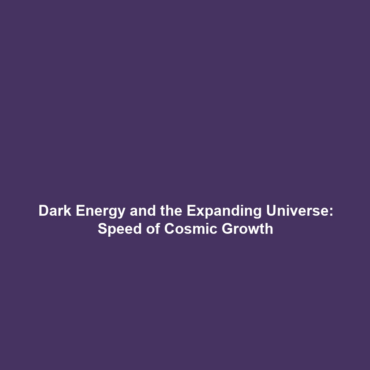Dark Energy and the Accelerating Universe: How Fast Are We Expanding?
Introduction
Dark energy is one of the most intriguing components of our universe, representing approximately 70% of its total energy content. Its discovery has significant implications for understanding the accelerating expansion of the universe. This article will delve into the key aspects of dark energy and explore how fast our universe is expanding. By examining these phenomena within the broader context of dark matter & dark energy, we can gain valuable insights into the fundamental workings of the cosmos.
Key Concepts
Understanding Dark Energy
Dark energy is hypothesized to be a mysterious form of energy that permeates all of space, accelerating the expansion of the universe. Its discovery stemmed from observations of distant supernovae, which appeared dimmer than expected, indicating a higher rate of expansion. This has led to several key concepts:
- The Cosmological Constant: Proposed by Albert Einstein, this concept suggests that dark energy exerts a repulsive force, counteracting gravity.
- Quintessence: A dynamic form of dark energy that varies in density over time, unlike the cosmological constant.
- Lambda Cold Dark Matter (ΛCDM) Model: A widely accepted cosmological model that incorporates dark energy and dark matter to explain the structure and evolution of the universe.
Applications and Real-World Uses
Understanding dark energy and its role in the accelerating universe offers several practical applications:
- Cosmology: Dark energy models are critical for cosmologists to accurately measure the universe’s expansion rate and understand its fate.
- Astronomical Observations: Advanced telescopes and observational techniques are employed to study distant galaxies, providing data crucial for deciphering the nature of dark energy.
These applications demonstrate how understanding dark energy is essential for advancements in the field of dark matter & dark energy.
Current Challenges
Despite advancements in the study of dark energy, several challenges remain:
- Detection Issues: Dark energy is difficult to detect directly, leading to uncertainties in its properties.
- Theoretical Conflicts: There are ongoing debates between competing theories explaining dark energy’s nature.
- Data Interpretation: Analyzing data from cosmic microwave background radiation and baryon acoustic oscillations presents complexities.
These challenges highlight the issues in dark energy research, making it a focal point for further study.
Future Research and Innovations
Upcoming research is pivotal for expanding our understanding of dark energy and its implications for the universe. Potential innovations include:
- Next-Generation Telescopes: Projects like the James Webb Space Telescope are expected to provide new insights into distant galaxies and the state of dark energy.
- Improved Computational Models: Enhanced simulations can help refine theories and predictions regarding the universe’s expansion.
These advancements may revolutionize how we investigate dark energy and the accelerating universe.
Conclusion
In summary, dark energy plays a crucial role in the accelerating expansion of our universe, making it an essential subject within the realm of dark matter & dark energy. As research progresses, understanding how fast we are expanding not only shapes our knowledge of the cosmos but also influences future scientific developments. For more information on related topics, explore our articles on dark matter and cosmology advancements.
